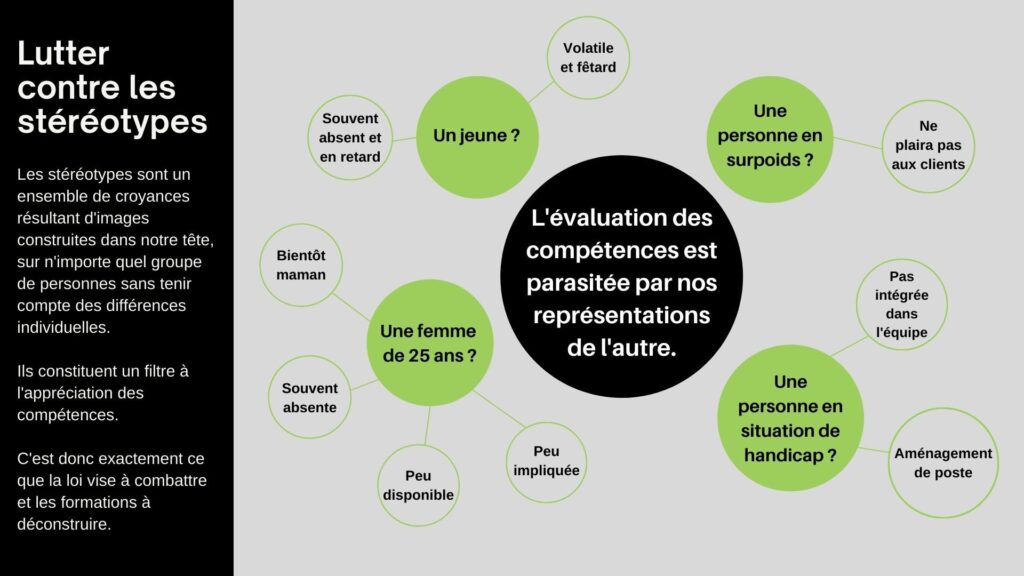Are we always objective when we recruit? How important are stereotypes in the recruitment process? How can we recruit without discriminating? These are all legitimate questions when faced with the legal obligation of non-discrimination in recruitment, which is accompanied by a training obligation for recruitment professionals. But beyond complying with the law, what other benefits can companies gain from discrimination-free recruitment? Yasmina El Alaoui, an expert in promoting diversity and combating discrimination, takes a closer look.

Professionals responsible for recruitment are required to undergo training in non-discrimination in recruitment at least once every five years. This legal obligation applies to companies with at least 300 employees and all companies specialising in recruitment. It is the result of the law of 27 January 2017 on equality and citizenship. But what exactly is discrimination? Are we all affected by stereotypes in the same way? Can we discriminate unconsciously? What are the risks involved? What do companies gain when they recruit without discriminating?
What is discrimination?
In France, the principle of non-discrimination is legally recognised. It is based on the republican principle of equal opportunities. Legally, discrimination is defined as less favourable treatment of one person compared to another. It is illegal when it meets two cumulative conditions. That is, when it :
- is based on one of the 25 prohibited criteria (marital status, pregnancy, surname, place of residence, disability, morals, sexual orientation, gender identity, trade union activities, etc.);
- and falls within a situation covered by the law (access to employment, services, housing, etc.).
Discrimination in recruitment: the facts and figures
The principle of non-discrimination enshrined in the labor code (articles L. 1132-1 to L. 1132-4) prohibits discrimination at all stages of working life. Yet the risk of discrimination in recruitment is still very real in France.
According to the latest Ifop survey, published in June 2021 for the job website Meteojob, one employee in five has experienced discrimination when applying for a job.

According to this data, the frequency of discrimination in recruitment varies according to the criteria prohibited by law. For example, 25 % of young people under 30, 23 % of women, 19 % of men and 42 % of people who perceive themselves as non-white have experienced it.
This survey also shows that the proportion of people who feel they have been discriminated against increases as the recruitment process progresses. For example, 14 % of people surveyed felt that their profile had been discriminated against when examining CVs, 17 % during the job interview and 18 % during the employer's decision-making process following the interview.
When our stereotypes have an impact on our decision-making...
According to Article L. 1221-6 of the French Labour Code, "information requested, in any form whatsoever, from a job applicant may only be used to assess his or her ability to hold the job offered or his or her professional skills. [They] must have a direct and necessary link with the job offered or with the assessment of professional skills".
That's the law. But, in reality, what information influences our assessments? Are they objective and based on skills? How do we judge that one person is less capable than another of occupying a given position? In practice, we rely on procedures, tools and experience. And so we may unconsciously associate candidates' skills with criteria that have nothing to do with the skills being assessed. Stereotypes therefore play a part in our decision-making. This is why, although some discrimination is intentional, most is unintentional.

Discrimination: what are the consequences for companies?
When they lose confidence in themselves, victims of discrimination can set themselves up for failure during the recruitment process, or even censure themselves. As a result, they no longer respond to job offers that match their profile. This is a loss for companies, because they can no longer benefit from their talents and creative abilities. All the more so for companies struggling to recruit against a backdrop of labour shortages..
Testing operations, name and shame, legal proceedings brought by people who feel they have been discriminated against... Discrimination also has a tangible cost: in addition to the risk of administrative, financial and criminal sanctions, companies risk damaging their image in the eyes of the general public. At a local level, they need to bear in mind that candidates communicate on social networks and by word of mouth.
A legal training obligation
Since 2017, non-discrimination training for those responsible for recruitment assignments has been a requirement for any company employing at least 300 employees and any company specialising in recruitment. The training must take place at least once every five years. This is set out in article L. 1131-2 of the Labour Code.
Why every five years ?
Because legislation changes regularly. Training also means keeping abreast of developments in the workplace. In 2008, the Labour Code set out 18 prohibited grounds for discrimination. Today there are 25. And a 26eaccent, should soon be added to this list to combat glottophobia in the workplace. Regular training is also a good opportunity to revisit your processes to adapt them to this principle of non-discrimination.
In which companies?
The training obligation only applies to companies with more than 300 employees. But ETIs (intermediate-sized companies), SMEs and micro-businesses are just as concerned, because the law prohibiting discrimination applies to everyone. As a result, these companies are just as exposed to legal action in the event of suspected discrimination. Furthermore, every recruiter wants to implement an efficient recruitment process.
Who to train?
Recruitment is a collective process. So it's a good idea to train the HR teams and managers, who often work hand in hand. And, on the other hand, the employees who take part in pre-qualifications on a regular or ad hoc basis.
What does the training provide?
Training allows you to revisit your processes, to question them at each stage of recruitment and to adapt them to the principle of non-discrimination. To do this, you need to learn how to :
- analyse skills requirements ;
- draw up job descriptions and advertisements without discriminatory criteria;
- deconstructing stereotypes ;
- revisit its selection processes (CV selection grids, telephone pre-qualification guides, questionnaires and skills-based interviews);
- organising the traceability of its recruitment ;
- diversify the pool of potential candidates through new sourcing and recruitment channels. communication.
The principle of non-discrimination: a constraint... and an opportunity?
Companies have recruitment difficulties. The shortage of skilled and unskilled workers, employees, self-employed people and tradespeople is a reality. The media are full of it: doctors, boilermakers, hairdressers, bakers, drivers, etc. are all desperately needed.
The COVID-19 crisis has also raised questions about the meaning that everyone attributes to work: balance between social, family and professional life, personal fulfilment, professional challenges, more flexible working hours, etc. For many people, the relationship with work has changed.
Ultimately, isn't the injunction not to discriminate an opportunity to respond to this context?
In short, recruitment without discrimination means :
- Identify candidates whose skills match the needs of the position;
- attract new talents ;
- welcome different ways of being, seeing and doing things, to boost the creativity and innovation ;
- promote diversity within the company and develop its employer brand.


